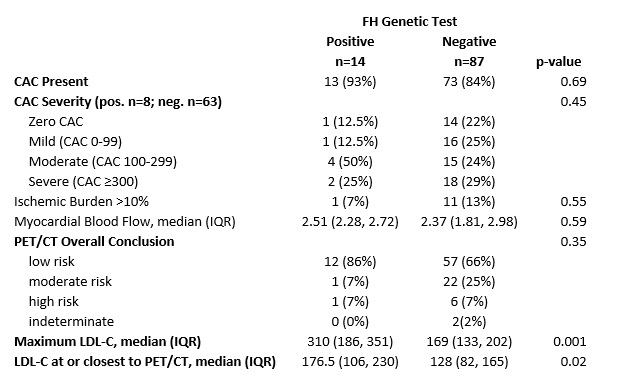Final ID: Sa3047
High Prevalence of CAC on PET/CT in Patients Undergoing Genetic Testing for Familial Hypercholesterolemia Regardless of Genetic Result
Abstract Body (Do not enter title and authors here): Introduction: Recently it was published that 40-50% of genetic positive familial hypercholesterolemia (FH) patients will have zero coronary artery calcium (CAC). However, it is unclear if this rate is similar to patients who met indications for FH genetic testing but had a negative genetic result. We tested the hypothesis that the presence of CAC will be similar for these 2 patient groups.
Methods: All patients undergoing genetic testing for FH from July 2016 to Jan 2024 (n=332) that also had a cardiac positron emission tomography-computed tomography (PET/CT) stress test (n=101) were studied. The presence of CAC was determined for these patients using the low-dose attenuated correction CT images. We further examined CAC severity for those with an Agatston CAC score (n=53) or with a report of CAC severity based on the low-dose attenuated correction CT (n=18). Fisher exact tests and Wilcoxon rank sum tests were used for the comparisons.
Results: Of patients undergoing FH testing (n=332), average age was 49±19 years, 51% were male, and 89% white. For those who had a PET/CT (n=101), the average age at time of FH testing was 57±13y, 59% were male, and 87% white. Patients who underwent PET/CT were less likely to have a positive genetic test (14%) compared to those without a PET/CT (27%) (p=0.006). The CAC, other PET/CT results and conclusions by the reading cardiologist, and maximum low-density lipoprotein cholesterol (LDL-C) are shown in the table. A large percentage of both positive (93%) and negative (84%) FH genetic tested patients had CAC present. The presence and severity of the CAC was not significantly different between these 2 groups. Other PET/CT results were also similar for the FH positive and negative genetic test groups. However, those with genetically confirmed FH had significantly higher maximum LDL-C than those with a negative result (p=0.006) and a higher LDL-C closest to the time of PET/CT (p=0.02).
Conclusion: While this is a small study of selected FH tested patients with PET/CT, we found nearly all of the genetically confirmed FH patients that had a PET/CT, had CAC. Those with genetically confirmed FH had almost double the LDL-C values compared to patients that tested negative for FH on genetic testing. However, this did not result in significantly higher rates or more severe CAC scores or higher risk assessment on PET/CT.
Methods: All patients undergoing genetic testing for FH from July 2016 to Jan 2024 (n=332) that also had a cardiac positron emission tomography-computed tomography (PET/CT) stress test (n=101) were studied. The presence of CAC was determined for these patients using the low-dose attenuated correction CT images. We further examined CAC severity for those with an Agatston CAC score (n=53) or with a report of CAC severity based on the low-dose attenuated correction CT (n=18). Fisher exact tests and Wilcoxon rank sum tests were used for the comparisons.
Results: Of patients undergoing FH testing (n=332), average age was 49±19 years, 51% were male, and 89% white. For those who had a PET/CT (n=101), the average age at time of FH testing was 57±13y, 59% were male, and 87% white. Patients who underwent PET/CT were less likely to have a positive genetic test (14%) compared to those without a PET/CT (27%) (p=0.006). The CAC, other PET/CT results and conclusions by the reading cardiologist, and maximum low-density lipoprotein cholesterol (LDL-C) are shown in the table. A large percentage of both positive (93%) and negative (84%) FH genetic tested patients had CAC present. The presence and severity of the CAC was not significantly different between these 2 groups. Other PET/CT results were also similar for the FH positive and negative genetic test groups. However, those with genetically confirmed FH had significantly higher maximum LDL-C than those with a negative result (p=0.006) and a higher LDL-C closest to the time of PET/CT (p=0.02).
Conclusion: While this is a small study of selected FH tested patients with PET/CT, we found nearly all of the genetically confirmed FH patients that had a PET/CT, had CAC. Those with genetically confirmed FH had almost double the LDL-C values compared to patients that tested negative for FH on genetic testing. However, this did not result in significantly higher rates or more severe CAC scores or higher risk assessment on PET/CT.
More abstracts on this topic:
Adverse Cardiovascular Outcomes in the Postpartum Period Associated with Upbringing-Related Social Determinants of Health
Tolu-akinnawo Oluwaremilekun, Anuforo Anderson, Ezekwueme Francis, Ogunniyi Kayode, Awoyemi Toluwalase
Combining metabolomic profiling with exome sequencing in the UK Biobank to predict cardiac outcomes and interpret variants of uncertain significance in familial hypercholesterolemiaJostins-dean Luke, Schut Kirsten, Kerminen Sini, Wurtz Peter, Barrett Jeffrey

